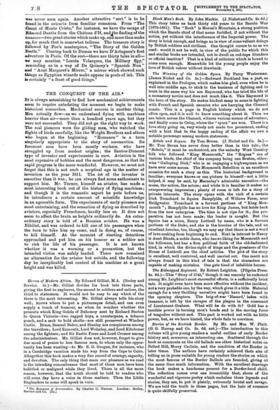THE CONQUEST OF THE AIR.'
IT is always astonishing to find how mechanical achievements seem to require antedating the moment we begin to make historical researches. Mechanical success is another thing. Men actually flew—as we understand flying with machines heavier than air—more than a hundred years ago, but they were not successful. They did not go the right way to work. The real pioneers were the gliding men, who watched the flights of birds carefully, like the Wright Brothers and others who began at the beginning. " Romance " is a term singularly appropriate to the story of aeronautics. Its foremost men have been mostly workers, who have struggled up from modest origins ; the Santos-Dumont type of inventor and experimenter ie rare. Aviation is the most expensive of hobbies and the most dangerous, so that its rapid progress is the more wonderful. However, we must not forget that this is not such a sceptical age in the matter of invention as the year 1811. The lot of the inventor is smoother than it was ; he can always find some enthusiasts to support him. Mr. Tumor, himself an aviator, has made a most interesting book out of the history of flying machines ; and though it is the romantic aspect he puts before us, he introduces a certain amount of scientific knowledge in an agreeable form. The experiments of early pioneers are most entertaining, and the sensation of flying as described by aviators, especially Frenchmen, hardly less so. It does not seem to affect the brain as heights ordinarily do. An extra- ordinary story is told of a Russian aviator. He was a Nihilist, and was ordered to kill one of his passengers when the turn to take him up came, and in doing so, of course, to kill himself. At the moment of starting detectives approached and put him on his honour as a soldier not
to risk the life of his passenger. It is not known whether it was a warning or a precaution, but the intended victim was safely landed. There now remained no alternative for the aviator but suicide, and the following day he inexplicably lost control of his machine at a great height and was killed.






































































 Previous page
Previous page